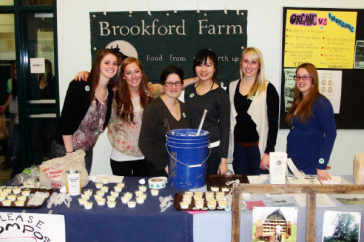UNH Dairy Bar Serving Local Greens With a Side of Science

L-R: UNH nutritional science interns Lauren Goldthwaite and Sarah Iske; Mary Brower of Brookford Farm; UNH students Vivien Fam, Kim Mayo, and Erin Greenhalgh Credit: Dover Foodservice staff
DURHAM, N.H. - The University of New Hampshire's Dairy Bar, a restaurant with the tag line "Local, Fresh, Sustainable," is serving salad greens this spring that couldn't be more local: they're grown just up the road at UNH's Woodman Farm. And before they're doused in vinaigrette, the gourmet greens have served science and helped inform New Hampshire growers about a potential new winter crop.
The project represents a collaboration among UNH Dining, which operates the Dairy Bar, and UNH Cooperative Extension and the N.H. Agricultural Experiment Station at UNH, which spearheaded the research.
"The goal of the research project was to investigate the feasibility of profitably producing greens and herbs in underutilized greenhouses during the winter months," says Becky Sideman, associate professor and Extension specialist in sustainable horticulture, who is conducting the research with Brian Krug, Extension specialist in greenhouse production.
Greenhouses around the state are often empty between November and February, Sideman says. Yet this time period coincides with the coldest, darkest time of the year. Given energy costs, she and Krug wondered, what are the optimum amounts of supplemental heat and light needed for growers to produce a profitable winter crop of gourmet greens?
The researchers launched their pilot study in September 2010 by planting 12 varieties of greens - including lettuce, endive, arugula, mache, mizuna, tatsoi, and spinach - in two identical UNH greenhouses with minimum temperatures of 60 degrees Fahrenheit in one and 40 degrees in another. All were grown in potting mix in "benchtop production" rather than in beds, since that's the setup of many greenhouses that are empty during this time period.
Calculating growth rate and production costs, the duo refined their pilot for a second planting in March 2011; it's these greens that are being used by the Dairy Bar. While results are very preliminary, Sideman notes that production during a New Hampshire winter is not cheap.
"The key to any kind of winter production is to have a pretty good market," she says. "Producers would need to sell these greens direct to consumers who are willing to pay for a local product." Farmers markets, community supported agriculture (CSAs), or perhaps restaurants committed to local procurement are potential outlets, she says.
Primarily supported by a grant from the U.S. Department of Agriculture through the New Hampshire Department of Agriculture, the project received additional support from UNH Dining, which is using about 50 pounds week of the greens per in Dairy Bar salads. "We're hoping it can go from a research project to how we do business," says Rick MacDonald, assistant director of UNH Dining. "The greens are delicious, and people really like them."
No stranger to sourcing local food, UNH Dining, through its Local Harvest Initiative, spends more than 20 percent of its budget on items produced within a 250 mile radius of UNH and hosts a popular Local Harvest Feast each fall. It regularly serves apples from UNH's Woodman Farm and since 2008 have cooperated with professor of plant biology Brent Loy to serve a butternut squash hybrid he was developing for farmers in the Northeast (see news release here: /unhtoday/news/cj_nr/2008/oct/bp21squash.cfm).
The Dairy Bar, revamped in summer 2008 with a focus on local foods and sustainable operations, provides the ideal outlet for Sideman and Krug's winter greens. "They're as fresh as you can get," says MacDonald.
"They're just fantastic," Sideman adds.
The New Hampshire Agricultural Experiment Station provided additional funding for this pilot project.
The University of New Hampshire, founded in 1866, is a world-class public research university with the feel of a New England liberal arts college. A land, sea, and space-grant university, UNH is the state's flagship public institution, enrolling 12,200 undergraduate and 2,300 graduate students.
-30-
Photographs available to download:
/unhtoday/news/cj_nr/2011/apr/bp26dairy_02.jpg
Caption: Undergraduate research assistant Nate Suhadolnik and Elisabeth Hodgdon, a graduate student research assistant, tend to winter greens as part of research at UNH; the greens are being served at UNH's Dairy Bar this spring. Credit: Becky Sideman
/unhtoday/news/cj_nr/2011/apr/bp26dairy.jpg
Caption: Winter greens grown for research at UNH's Woodman Farm are being served as salads at the UNH Dairy Bar this spring. Credit: Becky Sideman
Researcher Becky Sideman is available for comment at mailto:becky.sideman@unh.edu"
-
Media Contact
UNH Department of English | UNH Department of English | jkrasner@cisunix.unh.edu | 603-862-1877
Latest News
-
July 2, 2024
-
June 18, 2024
-
June 18, 2024
-
May 17, 2024
-
May 14, 2024

















































